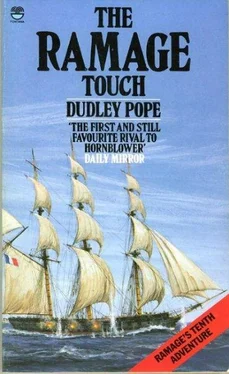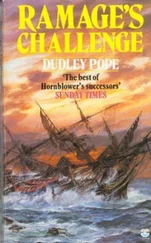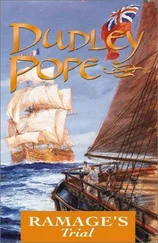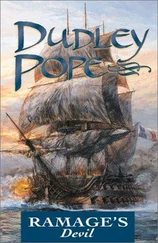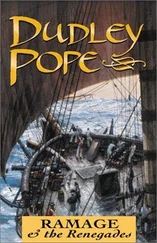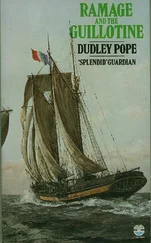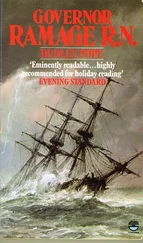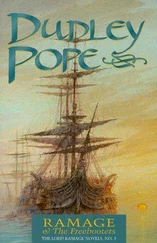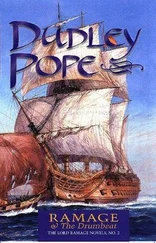That would make sense, he thought sleepily: the senior officer of a squadron of three 36-gun frigates could be a senior captain; but three frigates which were going to transport a regiment of artillery, cavalry and infantry, and escort two bomb ketches to a distant port might well be carrying a rear-admiral to a new command.
A rear-admiral would of course occupy the captain's cabin, and in turn the captain would move down a deck and take over the first lieutenant's cabin in the gunroom, the first lieutenant displacing the second, and so on ... The captain's secret papers would have been in his temporary cabin, leading off the gunroom, one deck down . . . which meant, Ramage realized as he stared at the box in front of him, the shock bringing him wide awake, that these might well be the rear-admiral's papers. But where was the rear-admiral?
There had been only two officers left alive on board the Furet, the oldish fellow with the wounded leg and a pimply youth; the rest had been killed. Both were wearing trousers and shirts, as though disturbed before dressing in uniform for the day. Yet the wounded man was well shaven; Ramage had particularly noticed that because usually French officers seemed to favour shaving the night before, so that one never saw them just shaven; always shaven twelve hours earlier, like innkeepers and ostlers.
He reached for the box, flipped open the lid and took out the contents. The first few papers were addressed to a Rear-Admiral Jean-Paul Poitier. A more reliable source of information, Ramage thought sourly, than a drunken artillery colonel boasting in an Orbetello inn.
Twenty or thirty documents of varying sizes, and most of them bearing the now-familiar oval symbol with the anchor in the middle and the words Fraternité and Egalité printed at the sides. What happened to Liberté, Ramage wondered. They were arranged in date order, the earliest on top.
The first was addressed to Jean-Paul Poitier, "capitaine de vaisseau" and telling him, in bureaucratic French so complicated that Whitehall clerks would have envied the prolixity, platitudes, irrelevances and redundancies, that the Minister of Marine and the Colonies had been pleased to advance him to the rank of "contre-amiral". The letter gave the date when the promotion would take place and added that further orders would be sent to him "in due course".
Poitier was in Toulon at the time, Ramage noted, commanding a ship of the line; probably one of the fleet that spent most of its time at anchor, yards sent down, sails stored on shore in rat-proofed buildings, cordage hanging in coils, and, he suspected, always fearing that Nelson would return.
He had to wait three months - "due course" seemed to be as long in Revolutionary France as it was in Royalist England - before being told he was to command a squadron "to be employed upon a special service". There was no indication of which ships would form the squadron, nor any hint of the nature of the "special service".
Three successive letters concerned pay and allowances for his new rank; a fourth instructed him to report to the prefect of the province to swear a new oath of allegiance upon his promotion. The government of France must be uncertain of itself if its officers had to swear oaths of allegiance at various stages of promotion, Ramage thought. British officers had to take the Test Act oath, but that was more a question of religion than of allegiance. Britain was lucky, he realized; the nation was not split, so that brother could find himself fighting brother. One tended to forget after all these years that the French war had started with Frenchmen revolting against Frenchmen.
The next letter acknowledged notification that "Citizen Jean-Paul Poitier, rear-admiral", had taken the oath and was to command a squadron comprising two frigates which would later join another frigate and two bomb vessels and form part of a fleet "now being assembled" and which was "intended for a special service".
Poitier's natural hope for an independent command must have suffered an unpleasant shock when he received that letter, Ramage thought. He was to be the third or fourth junior admiral in a fleet; at best he would be commanding a small squadron attached to the fleet. But what was the "special service"?
Poitier was then told to take two frigates under his command, hoist his flag in the Furet after she was commissioned, and as soon as both ships were provisioned for three months, to report the fact to the minister. Further orders arrived telling him that the frigates would be transporting cavalry, infantry and artillery, and although they were not to be armed en flûte, he was to draw extra hammocks and blankets from the army depot in Toulon, and take on an extra month's provisions, which the army would also supply.
Ramage read that with a smile; the chances of Poitier getting even one blanket out of the army depot in Toulon were nil, and only a bureaucrat in Paris could imagine that any army depot would have a supply of hammocks.
That was obviously a point made by Poitier in a letter to Paris, because a reply, signed by the minister himself, brushed aside "these minor supply problems" and said that a third frigate would be added to his squadron.
The minister told him to put to sea as soon as the third frigate was commissioned. He was to sail for Porto Ercole, in Tuscany, and there embark the 156th Regiment of Artillery, the 47th and 67th squadrons of cavalry and the 19th and 75th regiments of foot. Two bomb ketches, the Brutus and the Fructidor, which were also intended for the "special service", would join his squadron there, having previously watered and provisioned. They would be under his command and could embark any troops for whom there was no room in the frigates.
The letter gave Poitier the day by which his frigates should arrive in Porto Ercole and the date when the whole squadron, including the bomb ketches, should sail, but there was no mention of the destination. However, Poitier was assured that the bomb ketches had received relevant orders and been warned that they must not be late arriving in Porto Ercole. The commanding officers of the various army units involved, the minister added, were being informed "by the other Ministry". This phrase led Ramage to guess that the navy was having a quarrel with the war ministry. Events in Paris probably ran parallel to those in London, where at times a serving officer could be forgiven for thinking that the enemy was another ministry, rather than the French.
The war ministry in Paris had done its job, however, and its orders had been obeyed, because the troops had arrived in Porto Ercole on time.
There were a dozen documents left in the box, but it was obvious that none was going to mention the objective. The destination of the squadron and the fleet, and the nature of this "special service" were obviously closely guarded secrets. The French were wary enough not to commit anything to paper, never sure that ministry officials or others who might see written orders were not secret royalists, or British spies. Ramage finished reading through the remaining papers but they covered only routine matters.
It was getting hot and stuffy in the cabin, and Ramage remembered that the Calypso was still hove-to. Although he had gone through the papers in less than half an hour, there had not been enough time yet to complete the rescue of all the French survivors.
He locked the documents in a drawer of his desk and put the broken box in another, which he left unlocked. He picked up his hat. The sentry came to attention as he walked through the door, and halfway up the companionway he began to squint in the bright sunlight. The ladder was canted to starboard and the rays of the afternoon sun heated the woodwork, so that he could smell the paint as he went up.
Читать дальше
